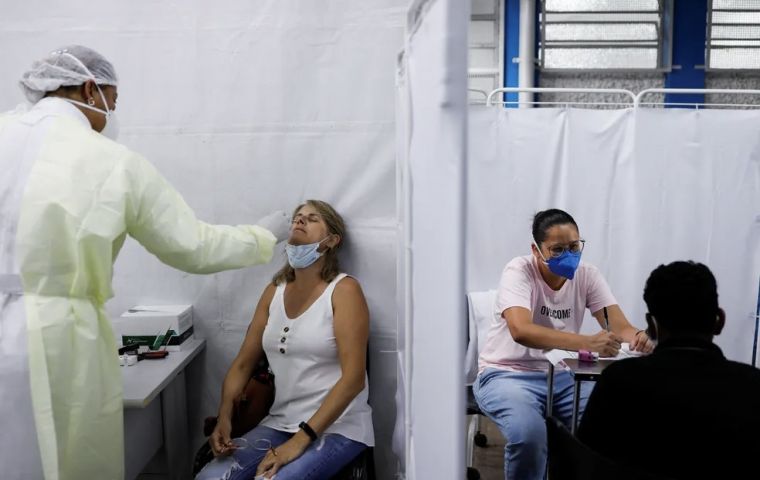(Source: Agencia Brasil)
“As laboratory data takes longer to enter the system, it is expected that the numbers of cases in recent weeks will be higher,” the experts warned The Rio de Janeiro-based Oswaldo Cruz Foundation (Fiocruz) has warned of an alarming increase in the number of COVID-19 cases in the Brazilian States of Amazonas, Rio de Janeiro, São Paulo, and Rio Grande do Sul.
According to Fiocruz‘s Infogripe Bulletin released Thursday, an increase in cases of Severe Acute Respiratory Syndrome (SARS) caused by COVID-19 was detected during the week from Oct. 30 to Nov. 5, with data entered in the Influenza Epidemiological Surveillance Information System (Sivep-Gripe) until Nov. 7.
“In the update, we observe not only the maintenance of this trend in the state of Amazonas, but also in three other states. It is important to remember that the data from laboratory results are partial, they are still incomplete information about the recent scenario and even so, it was possible to observe an increase in proven cases,” InfoGripe Coordinator Marcelo Gomes said.
“As laboratory data takes longer to enter the system, it is expected that the numbers of cases in recent weeks will be higher than what was observed in this bulletin, and may even increase the number of states in this situation,” he added.
Gomes also pointed out that it is still too early to identify the new sub-lineages of SARS-CoV-2 recently found in Amazonas and Rio de Janeiro. The expert also explained that COVID-19 has shown a tendency to have annual seasonality peaks in Brazil, unlike other respiratory diseases, which appear more frequently in the country only in the winter months. “Unlike influenza and other respiratory viruses with typically one peak per year, COVID-19 may be heading towards a reality in which we have to live with two moments of increase in its circulation,” he explained.
Brazil recorded an increase in cases of COVID-19 between May and June 2022, after the strong wave seen in January and February. This time around, Fiocruz mentioned an increase in hospitalizations for respiratory diseases in people 18 and older, and in Rio Grande do Sul, in people 60 and older. According to Infogripe, in the last four weeks, the prevalence of cases with positive laboratory tests for respiratory viruses was 14.8% for influenza A; 0.5% for influenza B; 26.1% for the respiratory syncytial virus (RSV); and 36.9% for Sars-CoV-2 (COVID-19).
“Among deaths, the presence of these same viruses among positives was 10.4% for influenza A; 0.0% for influenza B; 0.0% for RSV; and 74.6% Sars-CoV-2 (COVID-19),“ Fiocruz reported.
The city of Rio de Janeiro alone registered this week about 2,000 daily cases of COVID-19, while hospitalizations resulting from the disease more than tripled in four days, according to Rio City’s Health Secretary Daniel Soranz, who also underlined 286 units were deployed to perform up to 10,000 tests in a single day. The positivity rate, which was 6% in the second week of October, jumped to 29% this week.
”We had a very significant increase in the number of cases in the last two weeks. In the last two days, we have identified almost 2,000 cases daily, with more than 10,000 tests performed in a single day, and the positivity rate has been rising. So, at this moment, we still don’t have any increase in cases similar to what we registered in the past, but it is significant and puts the whole system on alert,“ Soranz explained while recommending that only people with respiratory symptoms should seek the test. ”Our recommendation is that people with respiratory symptoms wear a mask. And, if possible, people who have some kind of comorbidity or have not yet been vaccinated should also wear a mask,“ although he admitted a mandatory blanket measure was not being considered.
Soranz also pointed out that there had been a significant increase in hospitalizations for COVID-19 in the last four days, from 28 to 88 people. ”The municipality of Rio de Janeiro notified the entire surveillance system, we have an increase in hospitalizations, and we continue to monitor to verify if this increase will continue. Our main concern is that we know that the people who get hospitalized, who get seriously ill, are those who did not take the booster dose,“ he insisted.
Soranz also explained that there were no more doses of CoronaVac in stock, the only one authorized for children 3 and 4 years old. Hence, ”we had to interrupt the vaccination of 3 and 4-year-old children due to lack of CoronaVac doses. The vaccination of children 5 to 11 years old is still maintained with the pediatric Pfizer vaccine, which is available,“ although only 62% of the target patients had taken the two-dose basic scheme.
”With this new wave of the variant, BQ.1, we urge people who have not taken their children aged 5 to 11 years to be vaccinated to look for a health unit. We also insist that people who have not taken the booster dose seek a unit to take it,” Soranz added. The first booster dose was applied in 75.5% of the adult population, and only 35.4% went for the second booster.
Meanwhile, the federal Health Ministry began distributing 1 million doses of Pfizer‘s pediatric COVID-19 vaccine nationwide for children aged 6 months to 3 years, but only for those with comorbidities.
(Source: Agencia Brasil)
